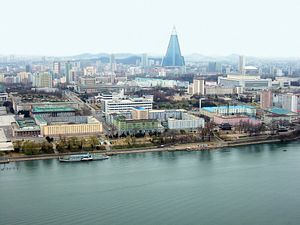Is North Korea’s dilapidated economy on the rise? And if so, does that mean better living standards for ordinary North Koreans? The answer to both seems to be “yes,” according to a report released Sunday by the Congressional Research Service.
Modest economic growth has improved conditions for a segment of the population, according to media accounts of the report. As per usual procedure, the think tank of the U.S. legislature did not make the report public.
The sunnier economic conditions can be attributed to limited agricultural and labor reforms introduced by the regime of Kim Jong-un, the report argues. In a break from its communist past, the government now allows farmers to keep a portion of their harvest and empowers managers to make some hiring and firing decisions.
Reports of growing wealth in North Korea aren’t new. Travelers to the capital Pyongyang, especially, have noted the emergence of relatively affluent middle class in recent years.
“Pyongyang and some other major cities are doing better, it seems,” Andray Abrahamian, the director of research at the non-profit Choson Exchange and a regular visitor to the country, told The Diplomat. “Consumers and consumption are certainly more evident in the capital in a way that is new.”
More generally, somewhat tolerated private markets have sprung up across the country to fill the gaps in the crumbling state distribution system, as cataloged in books like North Korea Confidential.
“It’s clear that Kim Jong-un is more interested in the economy that his father was and many technocrats and citizens are too,” said Abrahamian. “However, a lot of influential people are more focused on traditional security concerns. Over the long term I do think it will continue moving toward a focus on the economy, but it will take some time and it won’t be smooth.”
Nevertheless, economic assessments of the country demand to be treated with skepticism. As secretive as ever, North Korea does not release official economic data. South Korea’s central bank has estimated that its neighbor’s economy expanded a meager 1 percent last year, but even this is little more than an educated guess given the paucity of hard data available.
Even if you accept the CRS’s findings, 2015 has been a rocky year for North Korea’s economy. The government sealed the borders for four months in October in response to the global Ebola scare, bringing its small tourism industry to a standstill. A drought earlier this summer is believed to have significantly reduced harvests.
It’s also hard to judge how economic growth might be affecting the life of the average North Korean. The existence of a stark urban-rural divide is well-documented, and some 2 million North Koreans remain malnourished, according to the UN.
“For me, the very term “North Korea’s economy” is an oversimplification,” Joshua Stanton, the author of the blog One Free Korea, told The Diplomat. He explains:
North Korea’s economy is bifurcated between the have-nots in the provinces and the haves — the regime, the elites, and the donju (middle class), who are are mostly well-connected figures who trade with and on behalf of the regime, and largely supply the elite with goods that aren’t available to most North Koreans. Although there is more overlap between these economies today than there was five years ago, these remain two distinct economies for the most part.
Whatever progress has been made, one thing remains clear: most North Koreans remain poor by the standards of developed countries.

































